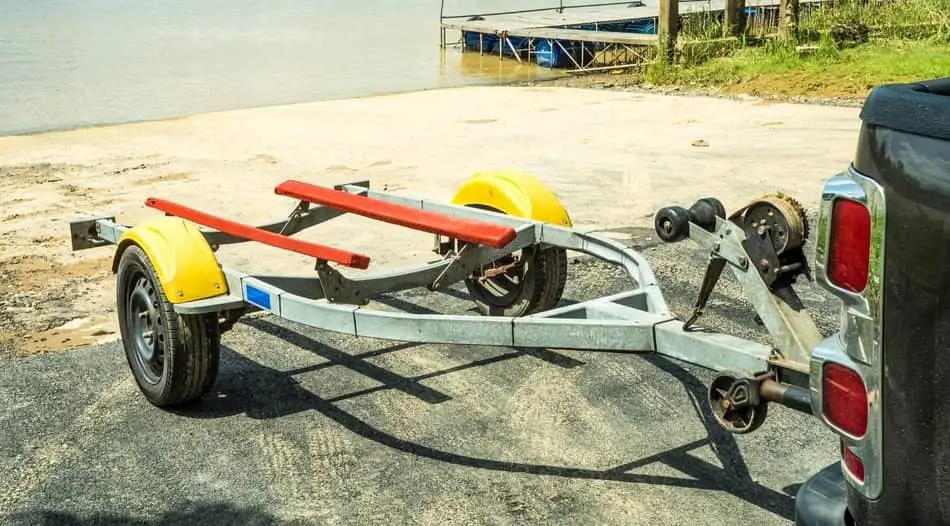Corrosion is one of the most common problems in boats and boat trailers. They will cause costly damages to a boat trailer in the absence of proper care. Wouldn’t it be nice to prevent the corrosion in the first place from happening? How to prevent boat trailers from rusting?
Washing a boat trailer after every use with fresh water and regularly lubing the vulnerable spots on the trailer (if needed) will prevent the boat trailer from rusting. Sometimes washing a trailer with a mixture of salt away or other products and water if used in saltwater is also a good practice.
At first glance, sometimes everything may look good, and you may think that the boat trailer is in good condition. But on closer inspection, you may find that the rust is accumulated in many places. The trailer may be ready for the scrap heap in just a few more years if not dealt with correctly.
Inspect the trailer biweekly or monthly so that you can get all the insights well. It’s just a matter of time until rust and corrosion take hold of your boat trailer. When it occurs, it’s time to take preventative action to extend your trailer’s working life or instead prevent them in the first place.
Some of the most vulnerable parts of a trailer to rust are leaf springs, fasteners (bolts, nuts, and other connections), wheel bearings, brakes, etc. You need to protect these parts adequately; these parts are like joints to the boat trailer. If one leaf spring is damaged, it’s gone.
Later in the post, we will see how to protect each of those parts in a detailed way. First, we will see the general cleanings.

Follow this procedure to prevent boat trailers from rusting
Spray lubricant on a trailer before getting in waters
All these lubricants like corrosionX, etc., will lubricate the trailer surfaces, not allowing water to react (pass) through them, preventing corrosion. Just wipe all the surfaces on the trailer before applying the lubricant so that the lubricant will work well (ensure everything is dry).
Spray the lubricant on the leaf springs, fasteners (bolts, nuts, and other connections), wheel bearings, brakes, etc., whatever places you want. If the lubricant is applied earlier and some lube is left (present) on the surfaces, you don’t need to spray on top of it.
Unlike WD40, corrosionX HD (heavy duty) (check the product in Amazon here) is a thick lubricant spray, and a good coating will last for many trips (typically six months or more) before it begins to wash off. So, use corrosionX HD on the leaf springs, brakes, etc. Use WD40 on fasteners, hubs, etc. (mainly on small parts and connections).
The rule is simple if the boat trailer parts aren’t lubricated enough, lubricate them; otherwise, don’t lubricate them. Excessive lubricating can catch all the dust and damages your trailer look. So, don’t lubricate excessively, or at least wipe it down before lubing them.
Use salt away or others while washing your boat
You probably have heard this so many times, but you shouldn’t miss the small details like washing the boat trailer with not only just water but with “freshwater” after “every trip,” and sometimes using products like “salt away” or “saltx” along while washing your boat trailer if it is submerged in salt waters.
Salt away, saltx, and other similar products (check them in Amazon here) remove all the salt particles that are stuck on the boat trailer (boat, jet ski, PWC, and inside the engine as well) and form a layer of a coat to prevent corrosion in the future. Some people use these products after every ride to prevent corrosion both internally and externally.
Washing and cleaning the boat trailer with fresh water after every ride is crucial to prevent rust. Weekly, once or twice, using salt away or similar products is also recommended if you go boating in salt waters. Otherwise, using those products isn’t needed much.
Remember, salt away, CRC salt terminators, etc., these products dissolve accumulated salt on the trailers or elsewhere and are generally used during cleaning or rinsing the trailer. Whereas corrosionX, WD40, etc., are lubricants and should be used to lubricate the parts and sprayed after when the boat trailer is dry, not wet.
Let it dry and lubricate the trailer (again)
All these lubricants like corrosionX, WD40, etc., will lubricate the trailer surfaces, not allowing water to react (pass) through them, preventing corrosion. Since you’ve washed your boat trailer, don’t apply them just after cleaning the trailer because water (moisture) + lubricant isn’t a good combination.
After washing the boat trailer, please wait for some time, let it dry, and then use the lubricant sprays (if needed) on the leaf springs, fasteners (bolts, nuts, and other connections), wheel bearings, brakes, etc. That way, you will lube those parts properly with the lubricants.
Unlike WD40, corrosionX HD (heavy duty) is a thick lubricant spray, and a good coating will last for many trips (typically six months or more) before it begins to wash off. So, use corrosionX HD on the leaf springs, brakes, etc. Use WD40 on fasteners, hubs, etc.
All these (lubricants) products will eventually wash away, so you need to check and apply them periodically. Even (rough) cleaning the lubricated surfaces will remove the lubes easily. Most importantly, use them on dry surfaces (parts), not on wet surfaces.
Before going further, check this small and helpful video on preventing rust on a boat trailer to have a visual understanding of the above process.
How to remove rust from a boat trailer
By now, you may know how to prevent boat trailers from rusting. There are some instances (in fact many) where even after using all the precautionary measures, you may get rust on your boat trailer. We will now see how to remove the rust from your boat trailer and clean it properly.
Scrub the rusted surfaces with a wire brush
Before starting the whole process, ensure that the trailer is dry, not wet. A dry trailer makes the whole process easy. Take a wire brush and rub it all over the rusted surface. If you don’t have one, you can get here by clicking this link (linked to Amazon).
Otherwise, if you have a drill, you can buy a wire brush for the drill (in Amazon here), and you can scrub the rusted trailer parts. The combination of both will work well. A handy wire brush will go to the places where the drill can’t go, and the drill will clean the rusted surfaces quickly.
If you don’t want to repaint the boat trailer, you can clean the trailer with a pressure washer and let it dry for some time and apply lubricant in the necessary areas. It is recommended to repaint the trailer every year or two, so see the below procedure (in preparing your boat trailer) if you want to repaint it.
Clean the trailer and apply the paint (if needed)
Ensure all the rusted areas are scrubbed well enough, and after that, it’s time to clean the trailer. Take a hose or pressure washer and start cleaning the areas that you have scrubbed. Ensure everything is cleaned properly before applying anything (paint) on the boat trailer.
After that, please wait for some time and let it dry. Applying any lubricant or any paint on a wet surface will result in a big failure. So, let the boat trailer dry completely. Based on the trailer type (steel or aluminum), apply the corresponding paint to your boat trailer.
More importantly, don’t apply any normal paints for your boat trailer because they just protect the paint from outside, and the water can pass through it, corroding the boat trailer internally. The trailer will look good externally, but internally it could be in a worse condition. Say a big “NO” for normal paints.
Recommended products to prevent a boat trailer from rusting
Lubricant (lube) sprays
CorrosionX (linked to Amazon) is a wonderful lubricant to prevent corrosion on your boat trailer (especially on leaf springs), and a good coating will last for many trips (typically six months or more) before it begins to wash off. It is worth every penny for the money you are paying.
WD40 (linked to Amazon) is a lubricant and will eliminate all the moisture present and acts as a corrosion Inhibitor to protect the corrosive elements to prevent rust. They are mostly used on fasteners (bolts, nuts, and around joints).
Cleaning liquids
Salt away (linked to Amazon) is used to remove all the salt particles that are stuck on the trailer surface, and it can also be used for cleaning (flushing) the boat engine as well.
CRC salt terminator (linked to Amazon) is similar to salt away cleans and protects anything exposed to salt by dissolving the accumulated salt.
For using salt away or CRC salt terminator, you need a small sprayer that is connected to the hose so that you can pour that liquid in the sprayer, and you can splash it on the trailer. Click here for a sprayer (linked to Amazon).
The key takeaways
Cleaning your boat trailer with fresh water after every use and lubricating the vulnerable parts like leaf springs, fasteners (bolts, nuts, and other connections), wheel bearings, brakes, etc., regularly will prevent your boat trailer from rusting completely.
If you are submerging your boat trailer in salt water, it is highly recommended to wash your boat trailer after every use. It is also good to use any salt dissolving products like salt away or CRC salt terminator. They will remove all the salt particles that are stuck on the surfaces, preventing corrosion.
After cleaning the boat trailer, let it dry, and then start applying the lubricant (if needed) on the vulnerable parts. By doing these two steps, you can prevent the boat trailer from rusting easily.
